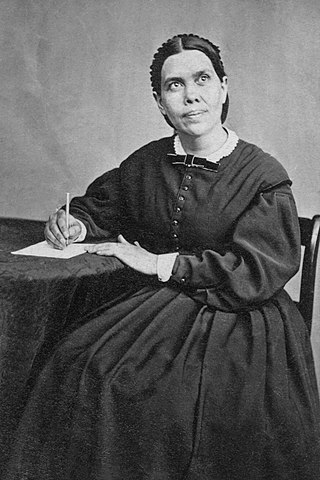
The Seventh-day Adventist Church is an Adventist Protestant Christian denomination which is distinguished by its observance of Saturday, the seventh day of the week in the Christian (Gregorian) and the Hebrew calendar, as the Sabbath, its emphasis on the imminent Second Coming (advent) of Jesus Christ, and its annihilationist soteriology. The denomination grew out of the Millerite movement in the United States during the mid-19th century and it was formally established in 1863. Among its co-founders was Ellen G. White, whose extensive writings are still held in high regard by the church.

Ellen Gould White was an American author and co-founder of the Seventh-day Adventist Church. Along with other Adventist leaders such as Joseph Bates and her husband James White, she was instrumental within a small group of early Adventists who formed what became known as the Seventh-day Adventist Church. White is considered a leading figure in American vegetarian history. Smithsonian named her among the "100 Most Significant Americans of All Time".

The Seventh-day Adventist Church had its roots in the Millerite movement of the 1830s to the 1840s, during the period of the Second Great Awakening, and was officially founded in 1863. Prominent figures in the early church included Hiram Edson, Ellen G. White, her husband James Springer White, Joseph Bates, and J. N. Andrews. Over the ensuing decades the church expanded from its original base in New England to become an international organization. Significant developments such the reviews initiated by evangelicals Donald Barnhouse and Walter Martin, in the 20th century led to its recognition as a Christian denomination.
The theology of the Seventh-day Adventist Church resembles that of Protestant Christianity, combining elements from Lutheran, Wesleyan-Arminian, and Anabaptist branches of Protestantism. Adventists believe in the infallibility of Scripture and teach that salvation comes from grace through faith in Jesus Christ. The 28 fundamental beliefs constitute the church's official doctrinal position.
Progressive Adventists are members of the Seventh-day Adventist Church who prefer different emphases or disagree with certain beliefs traditionally held by mainstream Adventism and officially by the church. While they are often described as liberal Adventism by other Adventists, the term "progressive" is generally preferred as a self-description. This article describes terms such as evangelical Adventism, cultural Adventism, charismatic Adventism, and progressive Adventism and others, which are generally related but have distinctions.
Spectrum is the official publication of Adventist Forum and a non-official publication of the Seventh-day Adventist Church, published four times a year. It was established "to encourage Seventh-day Adventist participation in the discussion of contemporary issues from a Christian viewpoint, to look without prejudice at all sides of a subject, to evaluate the merits of diverse views, and to foster intellectual and cultural growth." It presents a theological point of view which tends to be from the liberal progressive Adventist viewpoint.
Alden Lloyd Thompson is a Seventh-day Adventist Christian theologian, author, and seminar presenter. He is also a professor of biblical studies at Walla Walla University in Washington, United States.

Seventh-day Adventists Answer Questions on Doctrine is a book published by the Seventh-day Adventist Church in 1957 to help explain Adventism to conservative Protestants and Evangelicals. The book generated greater acceptance of the Adventist church within the evangelical community, where it had previously been widely regarded as a cult. However, it also proved to be one of the most controversial publications in Adventist history and the release of the book brought prolonged alienation and separation within Adventism and evangelicalism.
Historic Adventism is an informal designation for conservative individuals and organizations affiliated with the Seventh-day Adventist Church who seek to preserve certain traditional beliefs and practices of the church. They feel that the church leadership has shifted or departed from key doctrinal "pillars" ever since the middle of the 20th century. Specifically, they point to the publication in 1957 of a book entitled Seventh-day Adventists Answer Questions on Doctrine; which they feel undermines historic Adventist theology in favor of theology more compatible with evangelicalism. Historic Adventism has been erroneously applied by some to any Adventists that adhere to the teachings of the church as reflected in the church's fundamental beliefs such as the Sabbath or the Spirit of Prophecy. They misapply those who hold to mainstream traditional Adventist beliefs as synonymous with Historic Adventist.
Jonathan K. Paulien is a Seventh-day Adventist theologian.
Signs of the Times is a monthly magazine originally published by Pacific Press, a Seventh-day Adventist publishing house. Signs presents articles that are considered to be helpful in assisting readers to live in modern society. The magazine focuses on life's-style issues, health articles and Christian devotional and other religious articles. From its historical roots, the magazine emphasizes the second coming of Christ to this earth and living such lives so as to be able to meet Jesus at His second coming.
The Jat people are a social group of India and Pakistan.
Samuele R. Bacchiocchi was a Seventh-day Adventist author and theologian, best known for his work on the Sabbath in Christianity, particularly in the historical work From Sabbath to Sunday, based on his doctoral thesis from the Pontifical Gregorian University. Bacchiocchi defended the validity of the Feasts of the Lord, situated in Leviticus 23, he wrote two books on the subject. He was also known within the Seventh-day Adventist church for his opposition to rock and contemporary Christian music, jewelry, the celebration of Christmas and Easter, certain dress standards and alcohol.
The Adventist International Institute of Advanced Studies (AIIAS), is a Seventh-day Adventist graduate institution located in the Philippines, offering graduate degrees in Business, Education, Public health, and Theology. It is a part of the Seventh-day Adventist education system, the world's second largest Christian school system. AIIAS is a truly international institution, with faculty representing 18 countries. The institution has thus far served students from 123 countries around the world.
Arthur Nelson Patrick was a Seventh-day Adventist theologian and historian. At the time of death, he was an honorary senior research fellow at Avondale College in New South Wales, Australia. He also worked in pastoral ministry, evangelism, religion teaching, academic administration, and hospital chaplaincy for the Seventh-day Adventist church.
Ministry: International Journal for Pastors is an international monthly magazine for Christian ministers, with a circulation of approximately 78,000. It is published by the Ministerial Association, an official body of the worldwide Adventist church. It is aimed at pastors and ministers of the Seventh-day Adventist Church, and also those of other denominations. It has a monthly circulation of roughly 18,000 to Adventist church leaders, and a bi-monthly circulation of roughly 60,000 to clergy from other denominations on a complimentary basis. As of 2011 it was edited by Derek Morris. The current editor is Pavel Goia. Its ISSN is 0026-5314.
Gerhard Franz Hasel (1935–1994) was a Seventh-day Adventist theologian, and Professor of Old Testament and Biblical Theology as well as Dean of the Seventh-day Adventist Theological Seminary at Andrews University.
Richard M. Davidson is an Old Testament scholar at Andrews University, Michigan, where he is currently the J. N. Andrews Professor of Old Testament Exegesis.
Christopher R. Mwashinga, Jr is a Tanzanian author and poet from Mbeya, Tanzania who lives in the United States. He has published books of Christian poetry, theology, mission, and religious history. His poetry has been published in reputable anthologies in the United States, and other countries including Kenya, Singapore, and Tanzania. He writes in English and Kiswahili.





